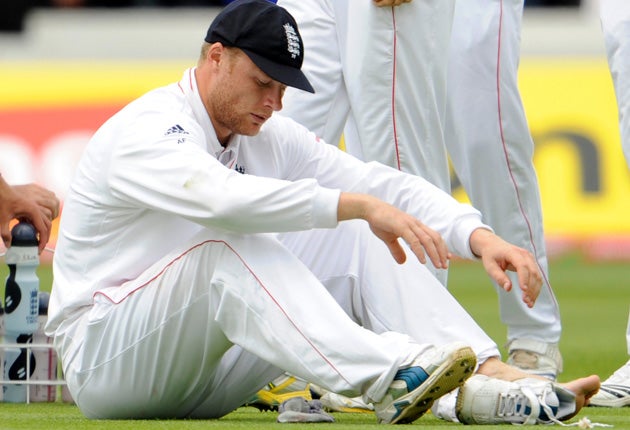Absence of talisman would pose selection conundrum
England face a tough choice between Bell and a fifth bowler if the star all-rounder pulls out. Stephen Brenkley weighs the tricky options

None of the signs was exactly good in Cardiff but it is to be hoped that England have a Plan B. For much of the time in Sophia Gardens it looked as though they had mislaid Plan A.
The need for an amendment, a fleetness of foot and mind which was missing in their batsmen and bowlers during the first Test, may become pressing in the next three days. It was hardly a shock announcement that poor old Andrew Flintoff, the talismanic warrior figure of their grand Ashes triumph four years ago, has sustained another injury.
But the changes in the team that will be entailed if he is missing from the side on Thursday will profoundly influence the 2009 series. It is the usual stuff but in cricketing terms it is as significant as it gets for England.
If Flintoff cannot play they will have to calculate if they dare go into the match with five bowlers and an extremely fragile lower middle order, or, equally adventurously, pick six batsmen to solidify the order and then choose only four bowlers when five could take a total of only six of Australia's wickets in Cardiff, when 20 are needed to win the match.
The swelling and soreness from which Flintoff is suffering is in the joint which he injured during his brief foray in the Indian Premier League in South Africa. It required surgery on a meniscus tear. There are suspicions that Flintoff has also had a plethora of cortisone injections around the joint and may be suffering from the after-effects. That itself heightens the feeling that he and England are willing to do anything to patch up his body this summer as a final hurrah in Test cricket.
But after one match it seems probable that, as so often, they will have to cope without him. It is impossible to conceive that England are involved in a game of double bluff with the Australians and therefore the assessment of the national selector, Geoff Miller, seemed bleak.
"At the first sign Flintoff's injury does not look dramatic but when there is pain and when he has had an injury like that before it is something you have to monitor," he said. "It does not look dramatically bad but it is a concern. We cannot afford to have someone who is not able to bowl their allotment of overs so we will have to assess it carefully."
In the last sentence lies the kernel of the debate. It presents a selection conundrum that will not be easily resolved. England accommodate his lesser batting prowess these days by demoting him in the order to seven, making it necessary to select Matt Prior because he is the only wicketkeeper in the country capable of batting at six. Prior's injudicious stroke in England's second innings, cutting against off spin, put in doubt this assessment but his dashing first innings offers reason to believe that it may be true.
If Flintoff has to withdraw, England must initially decide whether to strengthen their batting or their bowling. There is a case for both but they cannot do both. If the former, Ian Bell will be recalled to bat at No 6, a position where he has had his greatest success for England, scoring four of his eight Test hundreds, averaging almost 50, as opposed to No 3 where has scored no centuries and averages 31.
That means only four bowlers. Assuming that they will definitely play a spinner and that he will be Graeme Swann, they have to pick a trio of seamers from the remaining quartet in the squad. Taking their boldness a step further they could play Jimmy Anderson, Graham Onions and Stephen Harmison, omitting Stuart Broad because he is out of form and they would no longer need his batting so much.
This would be unlikely, so Harmison and Onions would be competing for one spot. The move towards Harmison, being propelled not least by Australians against whom he has taken 36 wickets at an average of 44.94 runs each in 14 matches, is hard to rebuff. But Onions bowls wicket to wicket. Five bowlers, of course, and they both play.
But the batsmen would have to perform like Test players as they so signally failed to do in Cardiff. Otherwise all plans from A to Z go out of the window.
Subscribe to Independent Premium to bookmark this article
Want to bookmark your favourite articles and stories to read or reference later? Start your Independent Premium subscription today.

Join our commenting forum
Join thought-provoking conversations, follow other Independent readers and see their replies